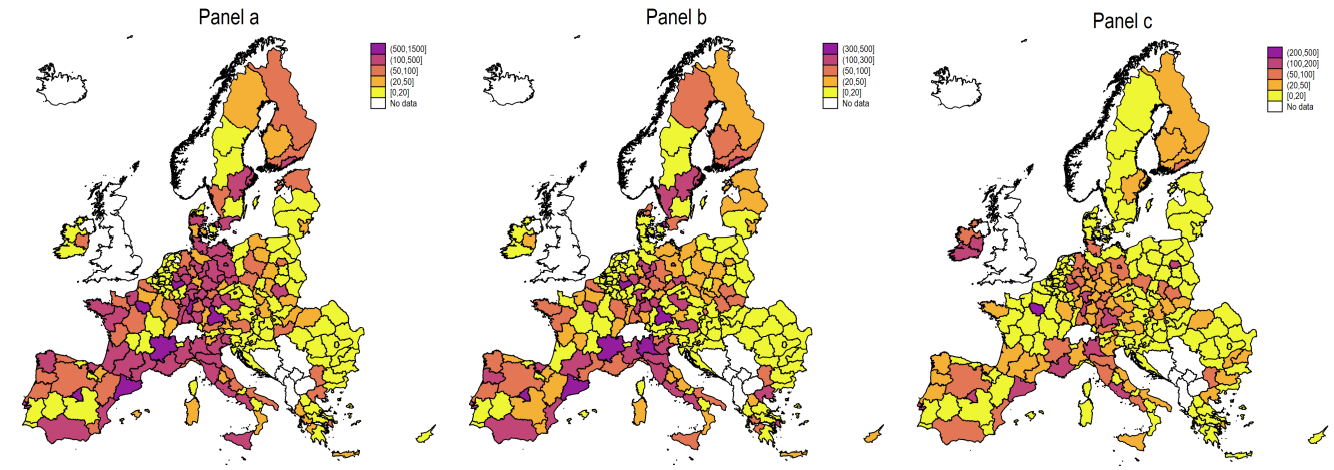Where are Europe’s skills produced?
19 May 2025

Mapping education and research to support the twin transition
The twin transition – the simultaneous move towards a greener and more digital economy – requires more than policy ambition: it demands a robust foundation of skills and scientific knowledge, embedded within regional innovation systems. But which territories are best positioned to meet this challenge? Where are the necessary capabilities being developed?
These questions are at the heart of ST4TE’s latest working paper, which presents a spatial mapping of higher education provision and research activity across European regions. Drawing on harmonised data from ETER, OpenAlex, and EUPRO, the report analyses enrolment rates, graduation patterns, EU-funded research projects, and scientific publication output to uncover key trends, and disparities, within Europe’s knowledge infrastructure.
One of the most striking findings is the asymmetry in the geographical distribution of educational provision. While undergraduate programmes are broadly accessible across the continent, advanced training, particularly doctoral education, is concentrated in a limited set of regions, mainly in Western and Northern Europe. These areas tend to host long-established research universities and innovation hubs, attracting both talent and resources. Yet this concentration raises concerns about growing territorial inequalities, as less central regions may struggle to develop the high-level skills needed to support structural transformation.
A closer look at disciplinary trends further reveals how the twin transition is reshaping educational priorities. STEM fields – especially engineering, information and communication technologies (ICT), and the natural sciences – are becoming increasingly prominent across all levels of higher education. This reflects the rising relevance of these domains in responding to both climate and technological challenges. Notably, student numbers in ICT programmes are expanding at both undergraduate and postgraduate levels, mirroring the growing demand for digital competencies in today’s economy.
However, this upward trend in ICT enrolment does not extend as clearly to doctoral education. ICT-related PhD programmes remain relatively stable across European regions. This likely reflects the strong pull of the labour market: as digital skills command high salaries and immediate career opportunities in the private sector, many potential doctoral candidates are drawn away from academic pathways. This tension between the need for advanced training and the incentives of industry highlights a structural constraint in Europe’s capacity to generate digital research expertise at the highest level.
The figure below illustrates the territorial distribution of PhD graduates in 2020 across three broad fields: natural sciences (Panel a), engineering (Panel b), and business (Panel c). Natural sciences dominate the doctoral landscape, especially in regions with a strong research base. Engineering PhDs are more evenly distributed, likely reflecting a broader industrial demand. Business doctorates, by contrast, remain highly concentrated and relatively scarce, pointing to a more limited institutional offering in that domain.

By combining education and research data, the report offers a comprehensive view of how institutional specialisation and territorial inequality jointly shape Europe’s preparedness for the twin transition. This mapping exercise sets the stage for the next phase of ST4TE, which will investigate how education systems influence the emergence of green, digital, and hybrid (‘twin’) occupations, and how these relate to innovation performance in local industry.
Ultimately, fostering a just and inclusive twin transition requires confronting a core policy dilemma: should investment be concentrated in regions already leading in research and education, or more evenly distributed to strengthen lagging areas? Striking the right balance between efficiency and cohesion will be critical as Europe navigates its path towards a sustainable and equitable future.
Article prepared by Ugo Rizzo, University of Ferrara